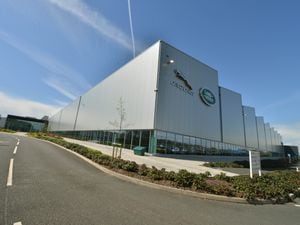JLR records loss as chip shortages hit business
Jaguar Land Rover swung into the red as the global shortage of microchips hit sales of its vehicles.

The luxury car maker, which had its engine manufacturing centre at the i54 north of Wolverhampton, posted a loss of £302 million for the quarter to September – compared to a profit of £65 million in the same period a year earlier.
Turnover slid 11 per cent to £3.9 billion as the company, which is owned by India’s Tata Motors, saw the number of cars sold dip in every major region as it dealt with huge manufacturing backlogs.
JLR sold 92,000 motors between July and September, compared to 114,000 in the same three months of 2020. Sales of every model bar the new Land Rover Defender dropped during the quarter.
Chip shortages have plagued car companies across the world after factories that made electronic components were forced to close for months on end during the pandemic.
Despite the impact of the semiconductor shortage on production and sales, the company continues to see strong demand for its products with global retail orders at record levels of more than 125,000 vehicles.
Adrian Mardell, JLR's chief financial officer, said: "The global shortage of semiconductors continued to constrain our production, sales and financial performance in the second quarter but we’re encouraged to see the continuing strong demand for our products with order books at new record levels.
"We were pleased the cash outflow on these volumes came in significantly better than expected, reflecting the progress we are making to reduce the break-even point for the business through product mix optimisation and cost controls."
The company's statement added that the lack of semiconductors has been "disproportionately" affecting its electric and hybrid cars, which it described as a key area it is trying to focus on.
Looking ahead, the group said the semiconductor shortage remains dynamic and difficult to forecast, however, it expects to see a gradual recovery starting in the second half of fiscal 2022. While supply remains constrained, the company said it will continue to take mitigating actions, including prioritising the production of higher margin vehicles for the available supply of semiconductors and closely managing costs.
Thierry Bollore, JLR's chief executive, added: “The global semiconductor shortage remains challenging, but I’m pleased to see the actions we have been implementing reduce the impact.
“With strong customer demand with a record order book we are well placed to return to strong financial performance as semiconductor supply begins to improve.
“At the same time, we continue to execute our Reimagine strategy to realise the full potential of the business and create the next generation of the most desirable luxury vehicles for the most discerning of customers – starting with the stunning new Range Rover.”





